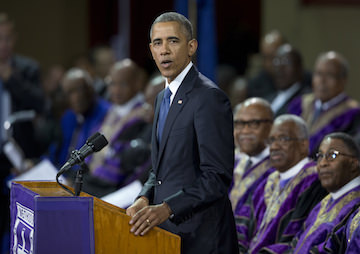After Obama’s Charleston Eulogy, What Will Change?
After a few choruses of "Kumbaya," things tend to go back to the way they were. Is there any reason to believe that this time things will be different? President Obama speaks during services honoring the Rev. Clementa Pinckney in Charleston, S.C., on Friday. Pinckney was one of the nine people shot to death during Bible study at Charleston's Emanuel AME Church earlier this month. (Carolyn Kaster / AP)
President Obama speaks during services honoring the Rev. Clementa Pinckney in Charleston, S.C., on Friday. Pinckney was one of the nine people shot to death during Bible study at Charleston's Emanuel AME Church earlier this month. (Carolyn Kaster / AP)
It is impossible to know whether the Charleston tragedy will someday be seen as a turning point in the nation’s long, difficult struggle with race. But we can hope.
At Friday’s funeral services for the Rev. Clementa Pinckney, one of nine men and women who were slain June 17 at historic Emanuel African Methodist Episcopal Church, hope was very much in the air. But what was the alternative? The slaughter of innocents at prayer, allegedly by a young white racist who killed black people to make a point, was an act of monstrous evil. Despair is one way to process such an event; imagining that some measure of good can come of it the other.
The antecedent that Charlestonians often mention is the Birmingham church bombing in 1963. But only in retrospect did that that horrific act of racial terrorism become a pivotal moment in the civil rights struggle. Common reactions at the time were anger, fear and grim resolve.
But it’s not 1963, as evidenced by the fact that the president of the United States, delivering Pinckney’s eulogy, spoke with the cadences of an A.M.E. preacher, getting the rhythm so right that the organist began to ornament the sermon with little runs and arpeggios. President Obama even broke into a verse of “Amazing Grace” — and thousands of mourners at the College of Charleston’s TD Arena sang along.
For Obama, it must have been a dizzying several days. First there was the massacre. Then members of the victims’ families confronted the alleged killer with forgiveness. Then South Carolina Gov. Nikki Haley sparked what looks like a definitive push by governments and businesses to get rid of the Confederate flag. Then the Supreme Court upheld a cornerstone of the Affordable Care Act, securing Obama’s legacy. And then, just hours before Obama spoke in Charleston, the justices ruled laws prohibiting same-sex marriage unconstitutional.
The theme of Obama’s eulogy was “the power of God’s grace,” which he said he had been contemplating all week. The killer at Mother Emanuel committed “an act that he imagined would incite fear and recrimination, violence and suspicion.” The president added, “Oh, but God works in mysterious ways.”
The church, or rather the arena, said amen.
Obama went on to talk about the Confederate flag and a host of other issues — poverty, education, jobs, racial discrimination, criminal justice, police violence, voting rights, gun violence. But he spoke indirectly and metaphorically, using the language of the pulpit.
The president said that in recent days he has sensed a new openheartedness. That’s certainly the way Charleston felt to me. The city, and really the whole state, displayed a remarkable sense of unity and common purpose. The crowd at Pinckney’s funeral — and earlier, at a huge gathering on the soaring Ravenel Bridge — obliterated all racial and ideological lines. Mother Emanuel is being smothered with love.
This might be temporary, of course, and in any event isn’t fair. Nine people shouldn’t have to die before state officials realize the Confederate flag is offensive and before neighbors of different colors look each other in the eye as they pass on the sidewalk. Symbols, however potent, cannot be passed off as a substitute for substance. And however magnanimous the victims’ loved ones may be, society cannot forgive the Charleston killer or the hate groups that inspired him.
After a few choruses of “Kumbaya,” things tend to go back to the way they were. Is there any reason to believe that this time things will be different?
Anyone who went to Pinckney’s funeral at least has to entertain the possibility. As the Mother Emanuel choir gave a rendition of the gospel song “Goin’ Up Yonder” that would warm even the most frigid soul, I couldn’t help but think of the verse in Hebrews that says “faith is the substance of things hoped for, the evidence of things unseen.” And that brought me back to the subject of hope.
Which, as I recall, is where Obama first came in — hope and change. There hasn’t been much of either emanating from the White House recently. But a confluence of events managed to infuse that Charleston arena with more of a sense of hope, and more of the possibility of change, than I’ve felt in a long time.
We have no choice but to find some way to understand the meaning of Charleston. So yes, let’s hope it opens hearts and minds. If so, then nine pious men and women will not have died in vain.
Eugene Robinson’s email address is [email protected].
© 2015, Washington Post Writers Group
Independent journalism is under threat and overshadowed by heavily funded mainstream media.
You can help level the playing field. Become a member.
Your tax-deductible contribution keeps us digging beneath the headlines to give you thought-provoking, investigative reporting and analysis that unearths what's really happening- without compromise.
Give today to support our courageous, independent journalists.






You need to be a supporter to comment.
There are currently no responses to this article.
Be the first to respond.